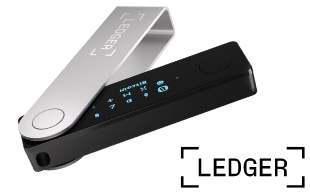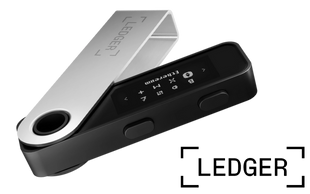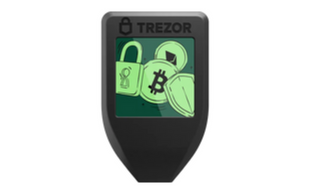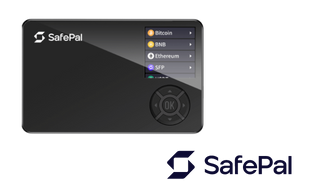
We’ve extensively reviewed the market to find the best cold wallet in Canada. To arrive at our top picks, we looked at the best hardware wallets on the market for safety, functionality, cost and supported digital assets—including coins, tokens and NFTs.
Best cold wallets in Canada for 2026
- Best cold wallet overall: Ledger Nano X Wallet
- Best value hardware wallet: Ledger Nano S Plus Wallet
- Best cold wallet for advanced users: Trezor Model T Wallet
- Best budget hardware wallet: SafePal S1 Wallet
- The original hardware wallet: Trezor Model One Wallet
- Best-designed hardware wallet: Ledger Stax Wallet
- Best hardware wallet for Bitcoin: COLDCARD Mk4
- Best for Bitcoin Layer 2 assets: Blockstream Jade
- Best recovery phrase backup device: Billfodl
You’ve probably noticed that brands like Ledger and Trezor dominate our list of the best cold wallets. These companies created some of the first-ever cold storage wallets, and each has a long track record of producing devices that have successfully protected customers’ assets. But that doesn’t mean you shouldn’t consider getting a cold wallet or hardware wallet from another brand.
Due diligence is especially important regarding crypto self-custody, so we’ve chosen to only showcase wallets that our team has first-hand experience with or that meet our strict criteria for inclusion.
This is not an endorsement of cryptocurrency or any specific provider, service or offering. It is not a recommendation to trade or use any services.
Find a crypto cold wallet
Here you can compare the most popular cryptocurrency cold storage and hardware wallets by price and the number of supported coins.

"I’ve been using a Trezor One for over five years, and it is still my daily wallet for crypto, despite now owning other more advanced and expensive hardware wallets. It’s simplicity makes it much easier and faster to use than other wallets I own, which is key for DeFi."
What is a hardware wallet?
A hardware wallet is a physical vault designed to safely store your cryptocurrency private keys. This specially designed hard drive usually connects to your computer or smartphone via USB and holds your coins and tokens in cold storage (offline).
Hardware wallets contain a range of security features to protect your digital currency keys like a PIN, a screen for viewing transaction details and buttons on the device for manually verifying transactions.
There are essentially two separate parts to a hardware wallet. The first part is an internet-connected desktop, mobile or web client that performs nearly all the same functions as any ordinary hot (online) wallet.
This software-reliant wallet creates, but can’t sign, transactions—which is where the second part, the physical hardware wallet with your private keys, comes in. Any transaction must be sent to your offline hardware wallet, verified by you and signed by the device before it can be completed.
Hot or Cold?
A hot wallet is any wallet that has an active connection to, or is hosted, on the internet. Hot wallets are more common than cold wallets and are often more user-friendly. Thanks to being connected to the internet, moving funds in and out of these wallets is quick and easy.
Unfortunately, this ease of use also comes with disadvantages, such as being susceptible to hackers, phishing scams and other threats. Examples of hot wallets include those offered by exchanges or web wallets like MyEtherWallet.
A cold wallet refers to any wallet stored offline. Cold wallet storage can refer to numerous methods, such as creating a paper wallet with a QR code, storing a wallet on an air-gapped computer (disconnected from the internet) or using a hardware wallet.
While considered more secure than a hot wallet, a cold wallet requires a physical object, is often slow to use and can be damaged in ways that hot wallets can’t. Hardware wallets are a particular type of cold wallet, popular for their additional security and redundancy features.
Why use a hardware wallet?
Generally speaking, crypto hardware wallets are considered the safest way to store the private keys to your digital assets for the following reasons:
- Private keys stored offline. Unlike browser extensions, mobile and desktop wallets—which are exposed to risks like hacking, malware and phishing scams—hardware wallets store the private keys to your assets offline.
- 12- to 24-word recovery phrase. If you lose your hardware wallet, you can regain access to your private keys using your 12- to 24-word recovery phrase.
- PIN and password protected. Hardware wallets are PIN or password protected for additional security.

"A hardware wallet is essential for anyone serious about cryptocurrency. They offer the highest level of security for your long-term investments and can be paired with a Web3 wallet for use with DeFi. I never use crypto without one. After security, the main difference is the number of blockchains supported, so make sure to choose one that suits your portfolio."
How to choose the best hardware wallet
If you’ve decided that offline storage in a hardware wallet is the best option, the next step is actually choosing a wallet. There are several reputable options available, so make sure you consider the following factors when deciding which one is right for you:
- Security features. How secure is the wallet, and what features does it offer? Is it secured by a PIN? Does it include its own screen? Can you verify transactions by manually pressing buttons? Have there ever been any reported instances of security breaches involving the wallet?
- Ease of use. Consider how easy the wallet is to set up and use. If you don’t completely understand the processes involved, there’s a very real risk of losing some or all of your funds. With this in mind, make sure the wallet makes keeping track of your crypto simple and straightforward.
- Supported coins. Check the fine print to make sure the coins, tokens or NFTs you want to store are actually supported by the wallet you’re considering using.
- Supported operating systems. Is the device compatible with the operating system your computer or smartphone uses?
- How you actually access your crypto. Hardware wallets usually come with native software (like Ledger Live or Trezor Suite). Many devices also let you interact with your crypto using a third-party wallet.
- Back up and restore. Read up on the process required to back up your wallet and restore your coins if something goes wrong. Is this process easy, and will it increase the level of security for your funds?
- Price. This is an important factor for many, as hardware wallets aren’t free. Compare the prices of competing wallets, including exchange rates and shipping costs if you’re buying from an overseas retailer, to get a better idea of which option offers the best value.
- Portability. This may not be an important feature for all users, but if you want to transport your wallet with you, consider how easy it would be to carry it around daily.
- Independent reviews. Find independent customer reviews for the wallet you’re considering. What do reviewers list as its pros and cons? What problems (if any) have they had when using it, and do they recommend it?
By considering these important features, you’ll have a much better idea of which hardware wallet is right for you.
Ask the experts: What are the most important features in a crypto wallet, besides security?
Hardware wallet pros and cons
Pros
- Considered to be the most secure way of storing private keys—more so than software or Web3 wallets
- Gives you full control of your private keys
- Supports a wide range of coins and tokens
- Allows you to recover your coins if your wallet is lost or stolen
Cons
- You’ll need to buy one—and prices can run up to hundreds of dollars
- Not quite as convenient as other wallet options when you need quick access to your crypto
- Not all coins are supported by every wallet
Hardware wallet security tips
Keep the following tips in mind to help ensure the security of your crypto coins and tokens:
- No wallet is 100% secure. If you want to ensure the safety of your funds, the buck stops with you. The most secure wallet in the world is useless unless you properly follow wallet setup or security instructions, so exercise caution at all times.
- Only buy from a reputable seller. Only buy your hardware wallet direct from the manufacturer or an authorized reseller, since buying a second-hand wallet puts you at risk of hacks and theft.
- Keep private details private. You should never disclose your hardware wallet’s secure PIN or your crypto private keys to anyone.
- Don’t lose your recovery seed. You need your recovery seed to access your crypto coins if your wallet is lost or stolen. So, make sure you write this seed on a piece of paper and keep it safe. Better yet, write it on several pieces of paper and keep them all in separate, secure places. Consider purchasing a recovery phrase backup device like Billfodl for even greater peace of mind.
Risks of using a crypto wallet
When you use a non-custodial crypto wallet, you reduce the risk of a third-party custodian like a crypto exchange going under and taking your funds with it. However, there are still risks to using both software and hardware crypto wallets.
Software wallets are always connected to the internet, and, for that reason, can more easily be hacked. Also, if the code for a software wallet is closed-source, you are placing trust in the creator of that wallet to not extract your private keys and, therefore, gain access to the digital assets you manage via the wallet.
Hardware wallets are generally more secure than software wallets in that they remain disconnected from the internet when they aren’t in use, while some never have to be connected to the internet. However, if you use a hardware wallet that has native software—like a Ledger or Trezor wallet—there is always the risk that your private keys can be extracted through an issue with the underlying software.
For extra safety, it’s best to create a multisignature—or “multisig”—set up in which you use two or more wallets to sign transactions and protect your crypto.
Bottom line
You might balk at spending more money to protect your crypto investments, but as countless well-publicized stories of exchange theft and insolvency have demonstrated over the years, “not your keys, not your coins.”
Storing the private keys to your crypto assets on a hardware wallet is widely recommended for anyone planning to make significant investments or hold crypto for the long term. Cold wallet crypto has a lower chance of being stolen than crypto kept in hot wallets like exchange wallets, which are easier to hack.
As always, though, do your own research to find the best cold wallet for your needs. Our guide to the best crypto wallets covers different types of wallets to help you decide which is best for you.
Crypto wallets market update: September 2025
Coinbase Wallet has rebranded as Base App to combine wallet functions with social features, trading and gaming.
Is crypto an appealing investment choice in Canada?
A little over one in five Canadians (21%) viewed cryptocurrencies like bitcoin and Ethereum as appealing investment choices in 2025, according to the Finder: Consumer Sentiment Survey January 2025. However, crypto meme coins (4%) and crypto-themed ETFs (6%) were not as popular.
Almost one in five Canadians (19%) said they planned to invest in crypto within the next two years. Even more said they would invest in stocks (33%) and high-interest-savings accounts (28%), while fewer respondents indicated that they would invest in real estate (11%) and bonds (10%).
FAQs about the best cold wallets
Sources
Disclaimer: Cryptocurrencies are speculative, complex and involve significant risks – they are highly volatile and sensitive to secondary activity. Performance is unpredictable and past performance is no guarantee of future performance. Consider your own circumstances, and obtain your own advice, before relying on this information. You should also verify the nature of any product or service (including its legal status and relevant regulatory requirements) and consult the relevant Regulators' websites before making any decision. Finder, or the author, may have holdings in the cryptocurrencies discussed.
More guides on Finder
-
Guide to the best Bitcoin wallets for 2026
Learn about the different types of crypto wallets and compare the best Bitcoin wallets in Canada.
-
Best wallet review
Best Wallet is a mobile crypto wallet that makes it easy to purchase and store crypto. But its features are still developing.
-
Ledger Wallet: Compare wallets, features and security
Your guide to Ledger crypto wallets, how they work and how to choose a Ledger wallet.
-
Ledger Stax review
Learn how the Ledger Stax stands out compared to previous Ledger hardware wallets.
-
13 best non-custodial wallets in 2026
Our round-up of the best non-custodial crypto wallets and what makes each one stand out.
-
Ledger Nano S Plus review
Learn about the capabilities, benefits and pitfalls of the Ledger Nano S Plus hardware wallet.
-
Trezor vs. Ledger
We compared Trezor and Ledger hardware wallets to see which has the most to offer.
-
Trezor Model T review
See how the Trezor Model T measures up as a crypto hardware wallet.
-
Trezor Model One review
See how the Trezor One compares in the world of crypto hardware wallets.








